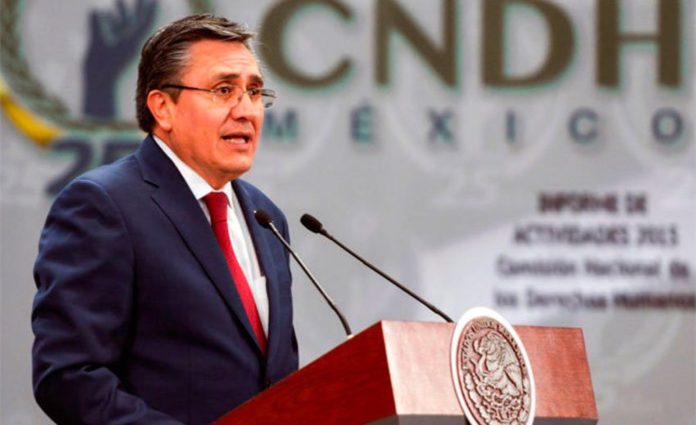President López Obrador today accused the National Human Rights Commission (CNDH) of “hypocrisy,” charging that it was an “accomplice” to human rights abuses committed by past governments whereas it is now critical of his administration.
The president’s attack on the independent organization came after it launched legal action against the National Guard in the Supreme Court, arguing that some of the secondary laws that govern the new security force’s operations are unconstitutional.
The CNDH has already been critical of the creation of the National Guard, stating in February that the security force is “not appropriate or viable because it doesn’t guarantee nor does it substantively contribute to ending impunity.”
Speaking at his regular news conference this morning, López Obrador said that he respected the CNDH and that it has the right to take legal action against the government.
“But I don’t believe that it has much moral authority because it remained silent, it was an accomplice when the state was the principal violator of human rights. And now, with us, they act in another way. In any case, it’s their work and we’re going to respect them but I don’t like hypocrisy,” he added.
The president also leveled a charge of hypocrisy at the CNDH in relation to its response to the 2009 ABC Daycare Center tragedy in which 49 children were killed in a fire in Hermosillo, Sonora.
“It’s not possible that they haven’t done anything to investigate the ABC daycare case,” López Obrador said.
“And they send us a recommendation about the daycare centers when what we’re doing is [ensuring] that there is no repeat of the ABC case. The world has been turned upside down,” he charged.
“It’s the same with the National Guard. What did they do to stop the massacres of past governments? What did they do to demand the appearance of the young men from Ayotzinapa?” López Obrador asked, referring to the 43 teaching students who disappeared in Iguala, Guerrero, in 2014.
Despite his annoyance at the CNDH, the president said the government will respect the legal rulings handed down in response to its Supreme Court challenges, pledging that if “they ask us to change the laws, we’ll do so.”
CNDH president Luis Raúl González Pérez said yesterday that the aim of the commission’s legal action was not to “hinder the development of government actions or to weaken institutions.”
“On the contrary, the possibility of our country achieving the security and peace it needs will depend to a large extent on the National Guard being an effective and successful [security] force,” he said.
However, González added that “we cannot allow its operation to have any vices, biases or defects that weaken it or make it questionable.”
Speaking at a National Public Security System meeting, the CNDH chief also called on the government to stop stigmatizing the Federal Police, whose officers have been protesting against their incorporation into the National Guard.
González also said there was no reason to completely disband the police force as Security Secretary Alfonso Durazo said last week would occur within 18 months.
After days of protests, López Obrador said this morning that the government had reached a 13-point agreement with dissenting Federal Police that included an end to protests, a guarantee of salaries and benefits and a promise of non-dismissal.
Source: Milenio (sp), El Universal (sp), El Sol de México (sp)
